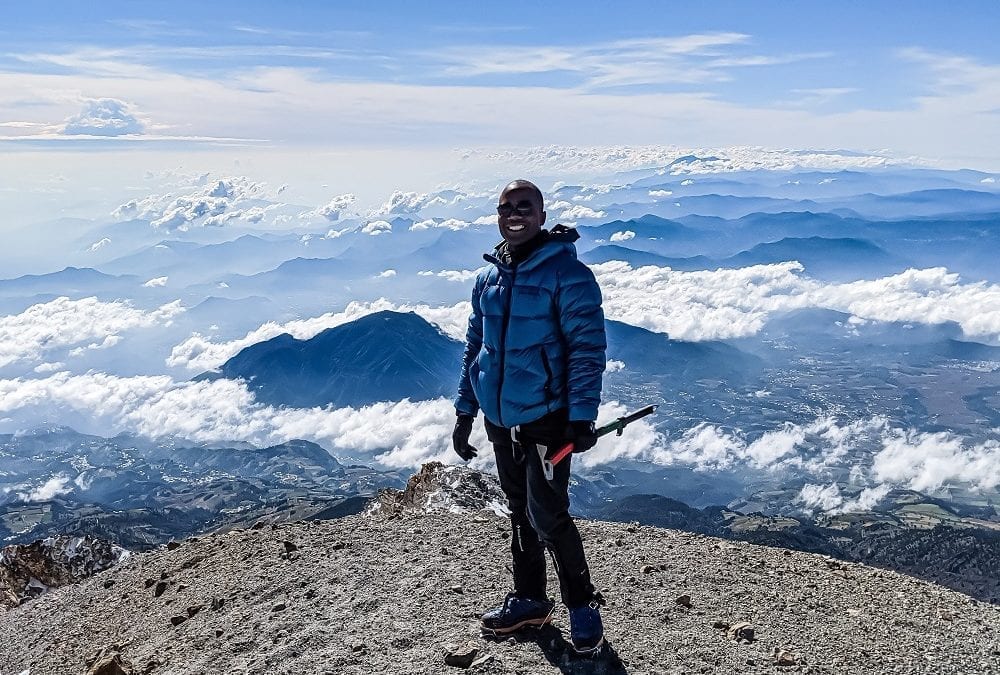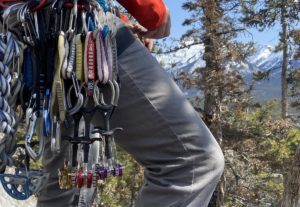Andrew King and The Between Worlds Project
The California-based climber is on his way to climb the seven highest peaks and volcanoes on each continent

Mountaineer Andrew King was raised in Detroit, moved to Oahu as a teenager and is now based in California. He’s a top surfer, experienced high-altitude climber and he’s on a mission to climb the seven highest summits and seven tallest volcanoes on every continent. A few years ago, he started Between Worlds Project, which aims to give exposure to individuals, non-profits, and developing communities battling sexism, racism, climate change, and other economic barriers. We touched base with him in February.
What are you hoping to accomplish with The Between Worlds Project? I hope The Between Worlds Project opens doors for others to respectfully witness and feel that the world is a beautiful place to explore from the highest mountain to the lowest depth, but along the way helping those that are navigating the space under the glass ceiling of what society says they should be and how far they should go based on their color, gender, religion or social status. I hope that The Between World Project involves a free platform where anyone looking to narrate and share their story of finding hope, happiness, love, strength, and confidence within the outside space can share and find funding for reaching their goal to go beyond the glass ceiling. So that one day on the other side of the glass ceiling each seat at the table represents an array of races, places and faces of people that can speak on their experiences and grow a sustainable future for the next generation of explorers on the mountain, in the ocean, or even in a meeting with non-profit or outdoor company. I look forward to the day that I’m an old man on the sands of Hawaii walking down the beach to see the Pipeline Masters and hear a teenager from a low-income area along the way say to their parents, hey I got a scholarship to go to Europe to become a mountain guide and study music at a college there. That kid turns and asks why I’m smiling and I say nothing and keep walking.
How important is it to have role models like you to help younger generations find access to climbing? I don’t just want to climb these mountains; I want to stand with humanity at the top of each on issues that impact us from racial issues to inequality to climate change along the way to the summit. If I reach a summit but did not speak or stand with the community that opened their arms and words for me along the way so I can learn from the moment I step foot at the basecamp to the monument I stand on the summit, then I never summited anything in my heart, besides my ego to be only seen. Role models and representation matter its hard envisioning yourself in that position or feel you even belong if you are not given a visual benchmark that shows you what is possible along the journey. My mentors/role models represent a kaleidoscope of races from white, black, Asian, Hispanic, and other beautiful parts of this world; Each having a huge impact on my climbing, surfing, corporate career, and outside experience. They gave me a sense of what it means to lead not just a team-up a mountain or through diving/surfing training, but what it means to lead myself to be who I truly want to be in this world, and be accountable for what I say and do while along that journey.
Who are some of your role models? My late great-grandmother, my grandparents, my older brother, my uncles, my mom. I grew up without a dad but was surrounded by a village of stronger women and men that guided me to be the first person in my family to ever go to college so they are forever my role models. In addition, there have been a number of leaders, climbers, divers, surfers, and other individuals that have given me their time to learn from them on what it means to evolve into a better human being. Along with anyone and everyone that is standing up and speaking up for those that have been marginalized against their own will and their value as being part of the human race.
What does your family think about your climbing adventures? No one grew up in my family or I knew as a climber, and I didn’t see in the media someone that looked liked me or had a story that related to what I identified with as life unless you speak about climbing fences, other than that we didn’t have access to that type of environment to know climbing and peak-bagging meant. We were just trying to survive economically and socially in the city whereas an African American you had greater odds and chance of going to jail or dying before 18 than a climber summiting Everest twice without oxygen does. My family doesn’t see it as bagging peaks, they see it as me being free to live a life that others from the environment I grew up in, wished they had the opportunity to experience. Very few escape the heavy odds weighted on them to ever move on from such a place to see the beautiful parts of the world.
What was the first mountain that you climbed and how life-changing was it? 770 Asbury Park Detroit Michigan was the first mountain I climbed. Walking from school each day you didn’t know if you were going to get shot in a drive-by shooting, get jumped, or stopped by the cops. As kids, my brother and I grew up having more mental mountains than we did physically. For us, the summit was getting up over the stereotypes and surviving the odds we dealt with each day in our own village. As for my first literal mountain, then I would say Diamond Head then over to Manu Kai in Hawaii were the first true mountains I climbed.
For those of us who haven’t visited Hawaii, what’s the climbing life and scene like? Hawaii is more of a hiking and good mountaineering training spot. When it comes to cardio, I have done Mauna Kea numerous times, in both warm and winter conditions. It does help with testing gear as well. Additionally, the Napali Coast repeatedly helped prepare me for doing long expeditions such as Aconcagua and other multi-day Alpine approaches where it required carrying in all of my gear over the course of an expedition.
How has covid affected your climbing plans and personal life? This past year was extremely challenging for me and my family due to covid. We, unfortunately, lost my great grandmother and three others close friends due to the virus, all within the same week. I would say that COVID gave me time to reflect, meditate, solidify my core values and be more accountable for who I wanted to be and what I stood for. At the same time, I wanted to be sure I showed respect to those that helped me out of Detroit and helped me get where I am today. I hope to pay tribute to them by standing not only top of these mountains but with their legacy to speak up for our race and anyone else that has felt or faced any devalue as a human in their life. As far climbing plans, I did have Elbrus lined up for 2019 which was pushed to 2020, but what COVID did was actually give me more time to think about coming out speaking on these issues vs me doing them behind the scenes for the past six years by myself, all while self-funded. I had time to think about who I wanted to partner with and what made sense with The Between Worlds Core Values and researching issues and non-profits more in-depth on who to work with.
What preparations are you doing for Denali? I train minimum 14 hours a week to max 21 hours a week, between working full time. Condition training is weights and muscle endurance. Cardio is a minimum of three sea-level to 1,000-foot-high sprints with a 30-pound pack. I climb Mount Baldy at least twice a month, winter or summer, to gear check and prep the body. Additionally I incorporate 10 hours minimum of the mental-physical recovery. I also have five training mountains I do before every big mountain in that region. So for Denali, I will be climbing the tallest volcano in North America again as well a few others to gear check. I also mix my big wave training with mountaineer training. This includes pool weight run training or deep water beach run rock training. Along with freediving training and breathwork for diving depths.
After Denali what peak would you want to attempt next? After I summit Denali, I plan to place my great grandmother’s ashes at the top and say my final goodbye to her. From there, I will be headed on to Europe to learn about the issues impacting culture and communities there, learning how to help while training on five mountains in the region to prepare me for a chance to summiting Mount Elbrus.
If you’d want people to take away one message from The Between Worlds Project, what would it be? Be more than just here. When we are given life, we are given a lottery ticket that has value based on our color and social status. We are never asked what color, race, social status, or place we would want to be born into. We must understand that not everyone’s life lottery ticket value pays out the same privilege or access to freedom. The key to unlocking that human component that brings us together to get the tools we need to build bridges so all can see and hear each other without being blinded by prejudice and bias. I’m not on this journey to just stand on mountain tops but to stand with and be a part of humanity as we explore what it means to find value in meaning in this lifetime and for future generations.


